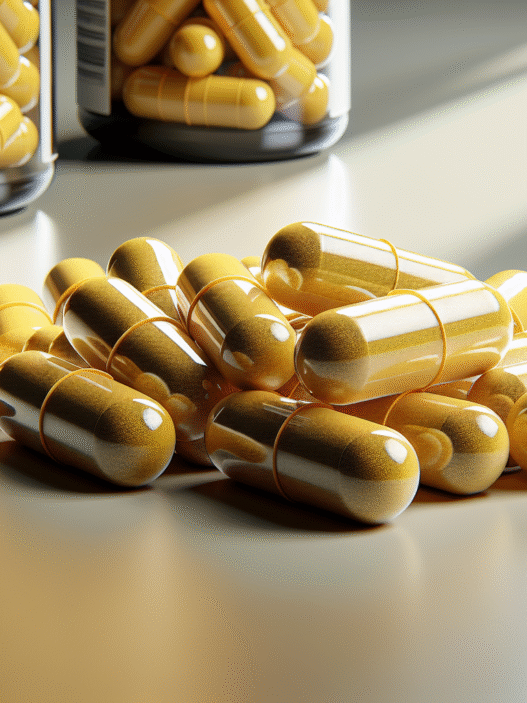Understanding Berberine
What is Berberine?
Berberine is a natural compound found in several plants, including European barberry, phellodendron, Oregon grape, goldenseal, and goldthread. It has gained attention for its potential health benefits, particularly for lowering blood sugar levels, promoting weight loss, and improving heart health. Research has highlighted its effectiveness in various therapeutic applications, making it a compound of interest among holistic wellness followers. For additional insights on potential drawbacks, see our article on is there a downside to taking berberine?.
Sources of Berberine
While berberine is not commonly found in typical diets, it is present in certain plants listed below:
| Food Source | Scientific Name |
|---|---|
| Goldenseal | Hydrastis canadensis |
| Goldenthread | Coptis chinensis |
| Tree Turmeric | Berberis aristata |
| Barberry | Berberis vulgaris |
| Oregon Grape | Mahonia aquifolium |
These sources provide a natural way to incorporate berberine into one’s diet, although they may not be widely available. For those interested in supplements, Nature Made offers better absorption formulas that enhance bioavailability compared to standard berberine hydrochloride (Nature Made).
It’s important for individuals to consider their options and consult health professionals before adding berberine to their routine, especially if they have pre-existing health conditions. Further questions about berberine’s effects on health can be explored through resources like what does mayo clinic say about berberine?.
Health Benefits
Berberine is associated with several notable health benefits that have drawn attention among functional medicine and holistic wellness followers. Below are three key areas where berberine demonstrates its efficacy: blood sugar regulation, weight management, and heart health.
Effects on Blood Sugar
Berberine has been shown to significantly reduce blood sugar levels in individuals with type 2 diabetes. Research indicates that taking 1 gram of berberine daily resulted in an average 20% decrease in fasting blood sugar levels (Healthline). This effect is particularly beneficial for those looking to manage their blood glucose levels and may assist in improving overall metabolic health.
| Study | Dosage | Result |
|---|---|---|
| Clinical Study | 1 gram/day | 20% decrease in fasting blood sugar |
Impact on Weight Loss
Weight management is another area where berberine can make a significant impact. A study involving individuals with obesity found that taking 500 milligrams of berberine three times a day led to an average weight loss of 5 pounds over 12 weeks. This makes berberine a potential supplement for individuals aiming to lose weight, especially when combined with a healthy diet and exercise.
| Study | Dosage | Weight Loss |
|---|---|---|
| 12-week Study | 500 mg 3x/day | 5 pounds |
Heart Health Benefits
In addition to its effects on blood sugar and weight, berberine may contribute to heart health. It can help lower cholesterol and triglyceride levels while increasing HDL (good) cholesterol. These changes can potentially reduce the risk of heart disease, along with addressing other risk factors such as high blood sugar levels and obesity. Understanding these aspects highlights the importance of berberine for cardiovascular well-being.
| Health Aspect | Effect |
|---|---|
| Cholesterol Levels | Lowers LDL and triglycerides |
| HDL Levels | Increases good cholesterol |
These health benefits make berberine a compelling choice for individuals interested in managing their blood sugar, weight, and heart health. It is essential to consider proper dosage and consult healthcare professionals when incorporating berberine into one’s regimen. For more information, you may also explore what the Mayo Clinic says about berberine or the potential downsides of its use.
Recommended Dosage
Berberine Dosage Guidelines
When considering what foods are high in berberine?, it’s important to understand the appropriate dosages for supplementation. For effective health benefits, the suggested dosage of berberine typically ranges from 250 milligrams to 500 milligrams, taken two to three times a day (WebMD).
| Dosage | Frequency | Total Daily Intake |
|---|---|---|
| 250 mg | 2-3 times/day | 500 mg – 1500 mg |
| 500 mg | 2-3 times/day | 1000 mg – 1500 mg |
Research has shown significant results when taking 500 milligrams of berberine three times daily. A 12-week study found that participants experienced an average weight loss of about 5 pounds, along with a 3.6% reduction in body fat (Healthline). Additionally, this dosage proved effective in significantly reducing body weight, body mass index, and belly fat within the study duration.
Before starting any new supplementation, individuals should consult with a healthcare professional, especially if they are considering higher doses or have underlying health conditions. For further insight, explore topics such as is there a downside to taking berberine? and who shouldn’t take berberine?.
Potential Therapeutic Uses
Treatment of Diabetes
Berberine has gained attention for its effectiveness in treating diabetes. This natural compound, found in various plants such as European barberry and goldenseal, has been shown to significantly lower blood sugar levels in individuals with type 2 diabetes. Research indicates that berberine can lead to a decrease in fasting blood sugar of approximately 20% when taken at a dosage of 1 gram per day. This makes it a valuable option for those seeking to manage their blood glucose levels.
| Study | Dosage | Result |
|---|---|---|
| 2008 Study | 1 gram/day | 20% decrease in fasting blood sugar |
Additionally, berberine works by improving insulin sensitivity, which is a crucial aspect of diabetes management. It enhances the body’s ability to utilize insulin, making it easier to maintain balanced blood sugar levels without relying solely on medication. For more details about potential downsides, consider reading about is there a downside to taking berberine?.
Management of High Cholesterol
Another significant benefit of berberine lies in its ability to manage high cholesterol levels. Studies show that berberine can effectively reduce overall cholesterol levels, including apolipoprotein B, a known risk factor for heart disease. It may also lower triglyceride levels, further contributing to heart health.
| Cholesterol Component | Effect of Berberine |
|---|---|
| Total Cholesterol | Decrease |
| LDL Cholesterol (bad) | Decrease |
| Triglycerides | Decrease |
| Apolipoprotein B | Decrease |
Berberine’s cholesterol-lowering effects are particularly relevant for individuals at risk of heart disease. By addressing underlying conditions like obesity and high blood sugar, berberine can help reduce the overall risk of cardiovascular issues. To learn more about whether berberine impacts heart health adversely, you may want to find out if is berberine bad for heart?.
Exploring these therapeutic uses of berberine illustrates its potential as a natural adjunct in managing diabetes and high cholesterol, highlighting its relevance in the holistic wellness space.
Additional Benefits
Berberine offers a variety of health advantages beyond its well-known effects on blood sugar and weight management. Two significant benefits include its anti-inflammatory effects and antioxidant properties.
Anti-inflammatory Effects
Berberine has demonstrated potent anti-inflammatory properties, which can help mitigate inflammation in various tissues throughout the body. Inflammation is a common factor in many chronic diseases, including heart disease and diabetes. By reducing inflammation, berberine may help lower the risk of these conditions.
Research indicates that berberine can inhibit the production of pro-inflammatory cytokines, leading to reduced inflammation and improved overall health. This quality makes berberine a valuable supplement for those dealing with chronic inflammatory conditions or seeking to enhance their wellness.
Antioxidant Properties
In addition to its anti-inflammatory effects, berberine is known for its strong antioxidant properties. Antioxidants help combat oxidative stress, which is caused by free radicals that can damage cells and contribute to aging and various diseases.
Preliminary studies suggest that berberine may provide protective benefits against conditions such as depression, cancer, and infections due to its ability to neutralize free radicals and enhance the body’s natural defense systems (Healthline). Integrating foods high in berberine along with its supplements may further enhance these protective effects.
The combination of these benefits highlights berberine’s potential as a multifaceted supplement for health and longevity. People interested in adding berberine to their wellness routine may also want to explore what foods are high in berberine? for natural dietary sources.
Berberine Supplements
Types of Berberine Supplements
Berberine is available over the counter as a dietary supplement, either alone or combined with other herbs and nutritional substances (WebMD). Here are some common types of berberine supplements:
| Type of Supplement | Description |
|---|---|
| Berberine Hydrochloride | The most common form, effective for various health benefits, including blood sugar regulation. |
| Berberine Phytosome | Encapsulated in a lipid layer, which enhances absorption. It has five times the bioavailability compared to standard Berberine Hydrochloride. |
| Berberine Blends | Combines berberine with other beneficial herbs and nutrients for enhanced effects, often targeting specific health objectives, such as cardiovascular health. |
Nature Made’s Better Absorption Berberine Phytosome capsules are particularly recommended for individuals looking to support cardiovascular health, as well as healthy glucose and lipid metabolism.
Best Practices for Supplement Use
To maximize the benefits of berberine supplements, the following best practices should be considered:
-
Dosage: Follow recommended dosage guidelines, typically ranging from 500 mg to 1500 mg per day, depending on the formulation and health goals. Consultation with a healthcare provider is advised.
-
Timing: For optimal absorption, it is advisable to take berberine supplements on an empty stomach, ideally before meals. This approach enhances its bioavailability.
-
Consistency: For the best results, take berberine consistently. It’s important to integrate it into a regular wellness routine instead of sporadic use.
-
Lifestyle Considerations: Pairing berberine with a healthy diet and regular physical activity can amplify its benefits, particularly in relation to weight management and blood sugar control. More details on weight loss effects can be found in our article on how long does it take to start losing weight on berberine?.
-
Recognizing Side Effects: Be aware of potential side effects and interactions with other medications. Individuals should consult a healthcare provider, especially if they have underlying health conditions. Additional insights are available in our articles on is there a downside to taking berberine? and who shouldnt take berberine?.
By understanding the various types of berberine supplements and following best practices for their use, individuals can make informed decisions in their journey toward improved health and wellness.





















